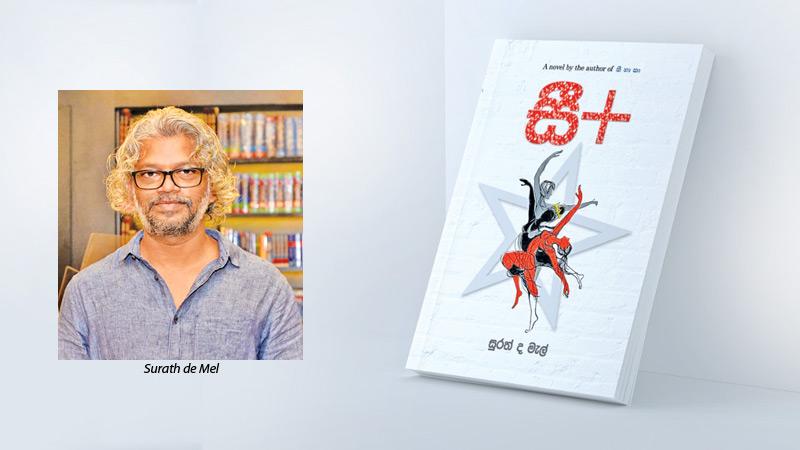
Does literature have a purpose? “Yes”, I strongly believe. Apart from providing entertainment, it is the responsibility of the author to offer something new, worthwhile and value for money.
That’s the kind of justice the reader, who spends days on end, expects from the writer. Going a step further, I would like if he could also provide me with new insights to contemplate on. If that could take the reader into an island of isolation, then the author has done justice to the reader to the hilt.
Latest book
 That’s exactly what young Surath de Mel has done again, in his latest book C+. As much as his previous book “Thee ha tha”, C+ too is equipped with all the ingredients to be another blockbuster. “Thee ha tha” was among the five finalists of the Sri Lanka Publishers’ Association’s “Swarna Pusthaka” Award of 2020, and a sellout of 20,000 copies, a remarkable achievement for a Sinhala paperback.
That’s exactly what young Surath de Mel has done again, in his latest book C+. As much as his previous book “Thee ha tha”, C+ too is equipped with all the ingredients to be another blockbuster. “Thee ha tha” was among the five finalists of the Sri Lanka Publishers’ Association’s “Swarna Pusthaka” Award of 2020, and a sellout of 20,000 copies, a remarkable achievement for a Sinhala paperback.
Surath belongs to the third generation of a strong pedigree of de Mels. No wonder that toddler Surath picked up the pen before the childhood toys.
C+ is unique for a few reasons. Firstly, it introduces us to the luminous and vibrant world of “reality” industry. Secondly, it exposes our naïveness to the bitter “realities” of the reality industry. Thirdly, it makes the society looks a mere sitting duck in the face of trickery of the unsuspecting media industry.
Two books of similar tenor come to my mind reading through the pages of C+. Harold Robins’ 1977 bestseller “The Lonely Lady” is one. Gunadasa Liyanage’s “Dona Kamalawathi” is the other. While these two too revolve around a young woman’s aspirations to become a “star” in the starbiz industry, the scenarios have hardly changed besides the changes in time and location.
Sexism
In short, sexism and exploitation still remain obstacles for a young girl to realise her ambitions in a male dominant world. In their rat race for success, what Kamalawathi went through in the sixties in Sri Lanka or Jerilee in the seventies in the US are not different to what Dil experienced over half century later, in globalised Sri Lanka.
Another striking feature of Surath’s authorship was his effortless and unbridled usage of language. Equipped with a wide array of vocabulary, he twists and turns the language towards his objective with an unrestrained ease.
While he quips with idioms to add colour to the narration, his metaphorical usage invites the reader to ponder over in reflection. Hundreds of phrases dispersed throughout the book like ‘Money relieves the weight on life and increases its pace’, ‘Confessing over a sin undone is no different to worrying over another person’s debts’, ‘the same book is never read by two persons’ not only adds colour to the text, but also “nonconformity” to the conventional present-day Sinhalese literature, only a bilingual reader/ writer like Surath could accomplish.
Surath is also a contributor to the New Internationalist, a rare distinction for a local writer.
C+ is woven between three undergraduate girls of the Arts Faculty - urban middle class Manasi (the first person), her rural batch mate Dil (the protagonist) and the high society Muthu.
Interestingly, they consider it a favour they do to the education system of the country, wasting four prime years of their creative and “high potential” youth on humanities in a university that is hardly geared to offer them anything better than the outdated and boring lectures that they were made to gulp and puke.
Extravagance
Invariably, their lives search for more “extravagance” that is found in abundance out there in the world. So when Dil joins the fray in the “Tharu Superstar” contest it gives a sense of worthiness to her friends to sharpen their primary interests. Thus, Manasi fine-tunes her lyricist skills and melomanics and Muthu busies herself embellishing Dil.
Success of Surath’s attempt to appear in first person female would be best judged by a biological female. Had he succeeded in comprehending the emotions that are coupled with the subtle estrogenic phases of a young woman during her sexually active life, then that again is another feather in Surath’s cap. Either way, his attempt of “cross dressing” is a bold one.
The trajectory of a rural lass with her unwavering dedication and flesh and blood pursuits for the success in the showbiz industry is the gist of the drama. When Dil commits herself to anything from changing her name to tossing herself to bed with anybody in her way to success, certainly it signals that she is not ready for anything less than the crown.
Some may succumb to her vicious but sweet quest, as for example as Ashen did. The lad was not only willing to take a backseat, but also to campaign for her through his own money.
But what Dil, her friends, fans and the gullible viewership were obscure of, and remains the top secret of a selected cabal of male media moguls was that “virtually” everything is a construct. A construct that is made of money, sex and fame. And being a human being is no exception to the rule.
That’s the rule of the game Surath has laid down in C+.
